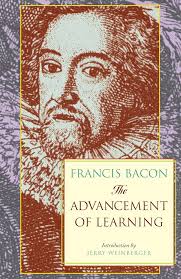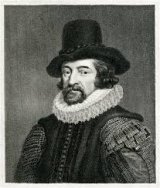The Advancement of Learning Page #40
The Advancement of Learning, published by Francis Bacon in 1605, is a foundational text in the history of science and philosophy. In this work, Bacon advocates for empirical research and the systematic organization of knowledge, laying the groundwork for the scientific method. The book critiques existing scholarly practices and proposes a new approach to learning based on observation and experimentation. It marks a significant shift towards modern scientific inquiry.
- Year:
- 1605
- 1,170 Views
Submitted by acronimous on August 11, 2024
Modified by acronimous on August 11, 2024
pretended to be invented, and so the middle propositions by derivation from the principles; their form of induction, I say, is utterly vicious and incompetent; wherein their error is the fouler, because it is the duty of art to perfect and exalt nature; but they contrariwise have wronged, abused, and traduced nature. For he that shall attentively observe how the mind doth gather this excellent dew of knowledge, like unto that which the poet speaketh of, Aërei mellis cælestia dona, distilling and contriving it out of particulars natural and artificial, as the flowers of the field and garden, shall find that the mind of herself by nature doth manage and act an induction much better than they describe it. For to conclude upon an enumeration of particulars, without instance contradictory, is no conclusion, but a conjecture; for who can assure (in many subjects) upon those particulars which appear of a side, that there are not other on the contrary side which appear not? As if Samuel should have rested upon those sons of Jesse which were brought before him, and failed of David which was in the field. And this form (to say truth), is so gross, as it had not been possible for wits so subtle as have managed these things to have offered it to the world, but that they hasted to their theories and dogmaticals, and were imperious and scornful toward particulars; which their manner was to use but as lictores and viatores, for sergeants and whifflers, ad summovendam turbam, to make way and make room for their opinions, rather than in their true use and service. Certainly it is a thing may touch a man with a religious wonder, to see how the footsteps of seducement are the very same in divine and human truth; for, as in divine truth man cannot endure to become as a child, so in human, they reputed the attending the inductions (whereof we speak), as if it were a second infancy or childhood. (4) Thirdly, allow some principles or axioms were rightly induced, yet, nevertheless, certain it is that middle propositions cannot be deduced from them in subject of nature by syllogism—that is, by touch and reduction of them to principles in a middle term. It is true that in sciences popular, as moralities, laws, and the like, yea, and divinity (because it pleaseth God to apply Himself to the capacity of the simplest), that form may have use; and in natural philosophy likewise, by way of argument or satisfactory reason, Quæ assensum parit operis effæta est; but the subtlety of nature and operations will not be enchained in those bonds. For arguments consist of propositions, and propositions of words, and words are but the current tokens or marks of popular notions of things; which notions, if they be grossly and variably collected out of particulars, it is not the laborious examination either of consequences of arguments, or of the truth of propositions, that can ever correct that error, being (as the physicians speak) in the first digestion. And, therefore, it was not without cause, that so many excellent philosophers became sceptics and academics, and denied any certainty of knowledge or comprehension; and held opinion that the knowledge of man extended only to appearances and probabilities. It is true that in Socrates it was supposed to be but a form of irony, Scientiam dissimulando simulavit; for he used to disable his knowledge, to the end to enhance his knowledge; like the humour of Tiberius in his beginnings, that would reign, but would not acknowledge so much. And in the later academy, which Cicero embraced, this opinion also of acatalepsia (I doubt) was not held sincerely; for that all those which excelled in copy of speech seem to have chosen that sect, as that which was fittest to give glory to their eloquence and variable discourses; being rather like progresses of pleasure than journeys to an end. But assuredly many scattered in both academies did hold it in subtlety and integrity. But here was their chief error: they charged the deceit upon the senses; which in my judgment (notwithstanding all their cavillations) are very sufficient to certify and report truth, though not always immediately, yet by comparison, by help of instrument, and by producing and urging such things as are too subtle for the sense to some effect comprehensible by the sense, and other like assistance. But they ought to have charged the deceit upon the weakness of the intellectual powers, and upon the manner of collecting and concluding upon the reports of the senses. This I speak, not to disable the mind of man, but to stir it up to seek help; for no man, be he never so cunning or practised, can make a straight line or perfect circle by steadiness of hand, which may be easily done by help of a ruler or compass. (5) This part of invention, concerning the invention of sciences, I purpose (if God give me leave) hereafter to propound, having digested it into two parts: whereof the one I term experientia literata, and the other interpretatio naturæ; the former being but a degree and rudiment of the latter. But I will not dwell too long, nor speak too great upon a promise. (6) The invention of speech or argument is not properly an invention; for to invent is to discover that we know not, and not to recover or resummon that which we already know; and the use of this invention is no other but, out of the knowledge whereof our mind is already possessed to draw forth or call before us that which may be pertinent to the purpose which we take into our consideration. So as to speak truly, it is no invention, but a remembrance or suggestion, with an application; which is the cause why the schools do place it after judgment, as subsequent and not precedent. Nevertheless, because we do account it a chase as well of deer in an enclosed park as in a forest at large, and that it hath already obtained the name, let it be called invention; so as it be perceived and discerned, that the scope and end of this invention is readiness and present use of our knowledge, and not addition or amplification thereof. (7) To procure this ready use of knowledge there are two courses, preparation and suggestion. The former of these seemeth scarcely a part of knowledge, consisting rather of diligence than of any artificial erudition. And herein Aristotle wittily, but hurtfully, doth deride the sophists near his time, saying, “They did as if one that professed the art of shoemaking should not teach how to make up a shoe, but only exhibit in a readiness a number of shoes of all fashions and sizes.” But yet a man might reply, that if a shoemaker should have no shoes in his shop, but only work as he is bespoken, he should be weakly customed. But our Saviour, speaking of divine knowledge, saith, “That the kingdom of heaven is like a good householder, that bringeth forth both new and old store;” and we see the ancient writers of rhetoric do give it in precept,
Translation
Translate and read this book in other languages:
Select another language:
- - Select -
- 简体中文 (Chinese - Simplified)
- 繁體中文 (Chinese - Traditional)
- Español (Spanish)
- Esperanto (Esperanto)
- 日本語 (Japanese)
- Português (Portuguese)
- Deutsch (German)
- العربية (Arabic)
- Français (French)
- Русский (Russian)
- ಕನ್ನಡ (Kannada)
- 한국어 (Korean)
- עברית (Hebrew)
- Gaeilge (Irish)
- Українська (Ukrainian)
- اردو (Urdu)
- Magyar (Hungarian)
- मानक हिन्दी (Hindi)
- Indonesia (Indonesian)
- Italiano (Italian)
- தமிழ் (Tamil)
- Türkçe (Turkish)
- తెలుగు (Telugu)
- ภาษาไทย (Thai)
- Tiếng Việt (Vietnamese)
- Čeština (Czech)
- Polski (Polish)
- Bahasa Indonesia (Indonesian)
- Românește (Romanian)
- Nederlands (Dutch)
- Ελληνικά (Greek)
- Latinum (Latin)
- Svenska (Swedish)
- Dansk (Danish)
- Suomi (Finnish)
- فارسی (Persian)
- ייִדיש (Yiddish)
- հայերեն (Armenian)
- Norsk (Norwegian)
- English (English)
Citation
Use the citation below to add this book to your bibliography:
Style:MLAChicagoAPA
"The Advancement of Learning Books." Literature.com. STANDS4 LLC, 2025. Web. 10 Mar. 2025. <https://www.literature.com/book/the_advancement_of_learning_3165>.








Discuss this The Advancement of Learning book with the community:
Report Comment
We're doing our best to make sure our content is useful, accurate and safe.
If by any chance you spot an inappropriate comment while navigating through our website please use this form to let us know, and we'll take care of it shortly.
Attachment
You need to be logged in to favorite.
Log In